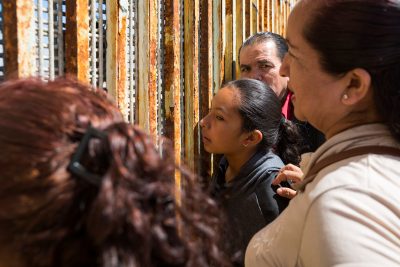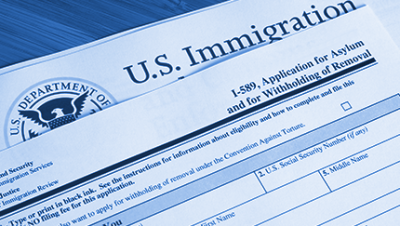Legal System
A just and fair legal immigration system upholds due process and adherence to the rule of law, while effectively managing immigration. Our efforts work to uphold the best version of the system, holding government entities accountable for fairly enforcing policies and addressing injustices at all levels of government.
What does the constitution say about due process?
The Fifth Amendment to the Constitution says clearly that no person shall be deprived of life, liberty, or property without the due process of law. Note that this says person, not citizen, and over the years the Supreme Court has consistently ruled that the Due Process Clause applies to all people in the United States.Do non-citizens have the right to due process in the U.S.?
Yes. The Constitution guarantees due process rights to all "persons," not just citizens. This means non-citizens, including undocumented immigrants, are entitled to fair treatment under the law. This includes the right to defend themselves in court. But recent Trump administration policies that speed up deportations and limit access to legal representation make it harder for non-citizens to get their fair day in court.- Access to legal representation Access to legal counsel is an essential part of our justice system and our democracy. In the criminal justice system, anyone facing even one day in jail gets a lawyer if they can't afford one. But immigrants facing deportation usually don't get that chance.The research is clear – the most effective way to ensure some level of due process for people navigating our complicated immigration system is for them to have trained attorney at their side. But Trump administration is now working to strip attorneys from as many people as possible, all in the name of increasing its deportation numbers. This attempt to eliminate basic due process will hurt people who already have few options.
- Fair day in court Due process guarantees that individuals have the opportunity to defend themselves in court. This includes non-citizens facing deportation.
Why is due process important?
We are seeing right now the importance of due process when it comes to President Trump's actions to carry out the so-called Alien Enemies Act, a 1798 wartime law that permits people to be deported outside of the normal framework of immigration law. President Trump has alleged that this law allows him to simply point at any person, declare them to be an alien enemy, and kick them out of the country without ever having a chance to see a judge. Thankfully, the Supreme Court said that is not true, and in a unanimous decision, ruled that people can challenge the Trump administration's invocation of the Alien Enemies Act. That is why due process is so important, because it means that no person can be rounded up and sent to another country without a chance to go to court and make the government prove their case.How is the American Immigration Council working to protect due process?
- We serve thousands of individuals in immigration detention centers through the Immigration Justice Campaign, our initiative with the American Immigration Lawyers Association. The Justice Campaign provides free legal services for immigrants who would otherwise have to navigate our complicated immigration system without a lawyer.
- We use the courts to demand a fair process for immigrants. Our litigation team is fighting back against the Trump administration’s blatant disregard for due process including filing a lawsuit challenging their illegal detention of immigrants in El Salvador’s notorious Terrorism Confinement Center (CECOT).

American Immigration Council Asks U.S. Supreme Court to Ensure Bond Hearings for Certain Immigrants Seeking Protection in the United States
The American Immigration Council, other immigrant rights organizations, and legal service providers filed a friend-of-the-court (or amicus) brief with the U.S. Supreme Court. The brief urges the justices to find that immigrants who seek humanitarian protection from removal should have access to bond hearings—instead of being subjected to mandatory detention. Read More

Trump’s Public Charge Rule Blocked Yet Again in Court
Update: On November 5, the Seven Circuit Court of appeals placed an administrative stay on the district court’s ruling, restoring the public charge rule at least temporarily. The Trump administration’s public charge rule has been blocked nationwide for a third time by a federal judge in Illinois who… Read More

Government Faces Lawsuit for Failing to Disclose Information on Expansion of Immigration Courts and Immigration Adjudication Centers
Public information about the location and expansion of these courts and centers is critically important. Read More

Lawsuit Seeks to Uncover Secretive Expansion of Judicial Black Sites for Immigration Cases
A lawsuit filed against the EOIR—which oversees immigration courts—and the GSA seeks information on the expansion and creation of immigration adjudication centers, which were established as part of EOIR’s Strategic Caseload Reduction plan designed to accelerate removal proceedings at the expense of due process. Read More

The Government Wants Immigrants to Show Up for Court—But Neglects to Tell Them How to Attend Their Hearings
Over 60,000 people at the southern border have been forced to return to Mexico under the Trump administration’s Migrant Protection Protocols (MPP), also known as the “Remain in Mexico” program. As they get sent back, U.S. government officials give them insufficient information about how to attend their immigration court… Read More

The Value of Pro Bono Legal Services in Immigration Detention
Once a year, National Pro Bono Week celebrates the pro bono work of lawyers, paralegals, and law students. Pro bono legal services—which come at no cost—are integral for many people otherwise left with little to no resources in immigration detention. Access to counsel in immigration detention is paramount to… Read More

Department of Justice Eliminates Diversity and Inclusion Training for All Immigration Judges
At a time when tensions over race in the United States are high, the U.S. Department of Justice (DOJ) announced in an October 8 memo that it will cancel all diversity and inclusion trainings for its staff of over 115,000 people. The decision could have a… Read More

The Difference Between Asylum and Withholding of Removal
This fact sheet provides an overview of withholding of removal, including the basics of seeking protection in the United States, eligibility requirements, the application process, and data on applicants. Read More

Comment on Executive Office for Immigration Review Proposed Rule Regarding Appeal Procedures and Administrative Closure
The American Immigration Council and the American Immigration Lawyers Association, through their joint initiative, the Immigration Justice Campaign, submitted this comment in opposition to the proposed rule, “Appellate Procedures and Decisional Finality in Immigration Proceedings; Administrative Closure.” The rule would strip the Executive Office for Immigration Review (EOIR) of… Read More

The American Immigration Council Mourns the Loss of a Fierce Advocate and Justice Seeker
Justice Ruth Bader Ginsburg, the second woman to serve on the Supreme Court of the United States and champion of fairness and equality, died Friday in Washington, DC. The following statement is from Beth Werlin, executive director of the American Immigration Council: Read More
Make a contribution
Make a direct impact on the lives of immigrants.
